There is a separate galaxy fitting into several tiniest islands in the South Pacific. There you can find two volcanoes, hotels on trees, the most powerful international organizations, and the least secure attitude towards women. It is a home for hundreds of homeless dogs and many more homeless insects, a residence of the most beautiful sunsets and the purest virgin Pacific waves filled with wild corals. It is controversial.
Climate Change
In Samoa, people hardly have Wi-Fi and not everyone uses DVDs, but every single Samoan experiences “climate change” as part of his life. At least, everyone knows what it is and discusses it. They even use UN terms because the United Nations (especially its development program) is the biggest international organization represented in Samoa, which constantly disturbs locals with its researches and surveys.
In general, widely deployed activities of international organizations such as SPREP or the UN, are justified here. This territory, known as South Asia Pacific Islands, is exposed to the highest risks connected with global warming and glaciers melting. Climate change, which climatologists and various UN scientists are unable to restrain within 2° C, leads to floods, cyclones and hurricanes.
In 2008, islands such as Upolu and Savai’i (both being the two biggest in the archipelago) were heavily hit by a tsunami, which almost completely destroyed the southern part of Upolu Islands. And in 2012, Samoa went through a cyclone that devastated the island’s infrastructure, mainly roads.
It is not an exaggeration to call Upolu’s southern part heavenly. White strip of sandy beaches with fales (wooden roofed huts with columns instead of walls, which bear the roof and are used to hide from the sun) and villages are separated from the rest of the island with a high cliff. The view is marvelous.
Visiting Apia
Apia is the capital of Samoa and is situated on Upolu. Despite the fact that Samoa is considered less developed economically than Fiji, Apia offers higher living standards than Suva, Fiji’s capital. Roads are wide and spacious with fewer people and therefore there is less noise and exhaust.
Being a fan of British literature, I was surprised to learn Apia was the last home for Robert Louis Stevenson, a prominent Scottish writer. He and his wife settled there in 1889. Traveling around the South Pacific improved his health, and he spent the last years of his life in Samoa. He bought 314 acres of virgin land on the slopes of Mount Vaea above Apia and named the estate Vailima, or “Five Waters,” because five streams crossed the property. Stevenson died five years after, at the age of 44, and was buried on the top of Vaea. The hard path that leads up to his grave is called, “Road of the Loving Hearts.”
In Apia, there are five cafes I highly recommend:
- Yacht Club: a marine-style restaurant with an ocean view and a very hospitable personnel.
- Tifamoana: a pleasant Indian restaurant.
- Paddles: an Italian restaurant close to the ocean.
- Milani: an Italian cafe in the heart of Apia, which has a simple European elegance and genuine Italian cuisine. As one of very few places in Apia where Lavazza coffee is served, the cafe is owned by a wonderful family of a brother and three sisters – half Samoan-half Italian – who brought all necessary kitchen equipment here from Italy.
- Hill-side Cafe: a pleasant in-home style place on a hill, in the outskirts of Apia. You can come over there for lunch on your way to the ocean, and enjoy a marvelous mountain view sipping coffee on the balcony. The kitchen is hardly detached from the main hall, so you can easily watch the food being prepared.
When choosing what to dine with in tropics, avoid ordering reef fish like barracuda, red snapper, and grouper. You might get ciguatera poisoning, from which it takes six months to recover.
Another miracle in Upolu which is worth visiting is Lupe Sina hotel on trees. Do you remember your childhood games when you were rushing home after school to play cowboys and Indians, hide-and-seek, build shelters on trees… This “treesort” south of Apia is a dream come true:
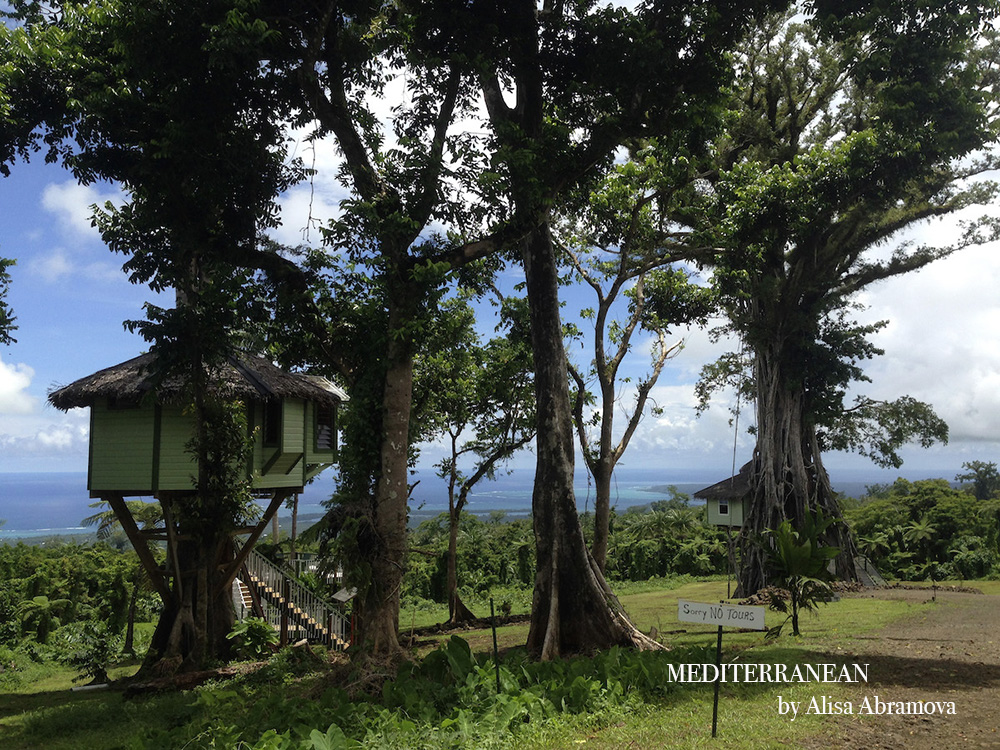
The Beaches of Samoa
Samoa is a cradle of heavenly sandy strips. Even Fiji cannot boast of the same variety of natural beauty. Beaches are peppered with fales – wall-less huts perfect for ocean-side relaxation. Some little resorts offer fales overnight, and those usually have a mosquito-net cloth replacing walls.
Just imagine falling asleep with the vast ocean in front, lulling you with its cozy noise. The best place to do it in Samoa is Taufua Beach, situated in Lalomanu, 60 KM to the east from Apia and one hour by car.
Other majestic must-go-and-get-tanned beaches on Upolu island include:
- Vavau Beach and Matareva Beach. Both are situated on the other side of Upolu, opposite Apia. It takes approximately 50 minutes to reach each beach from Apia.
- To Sua: It is not really a beach, but a fale-resort around a cage where you can dive and swim.
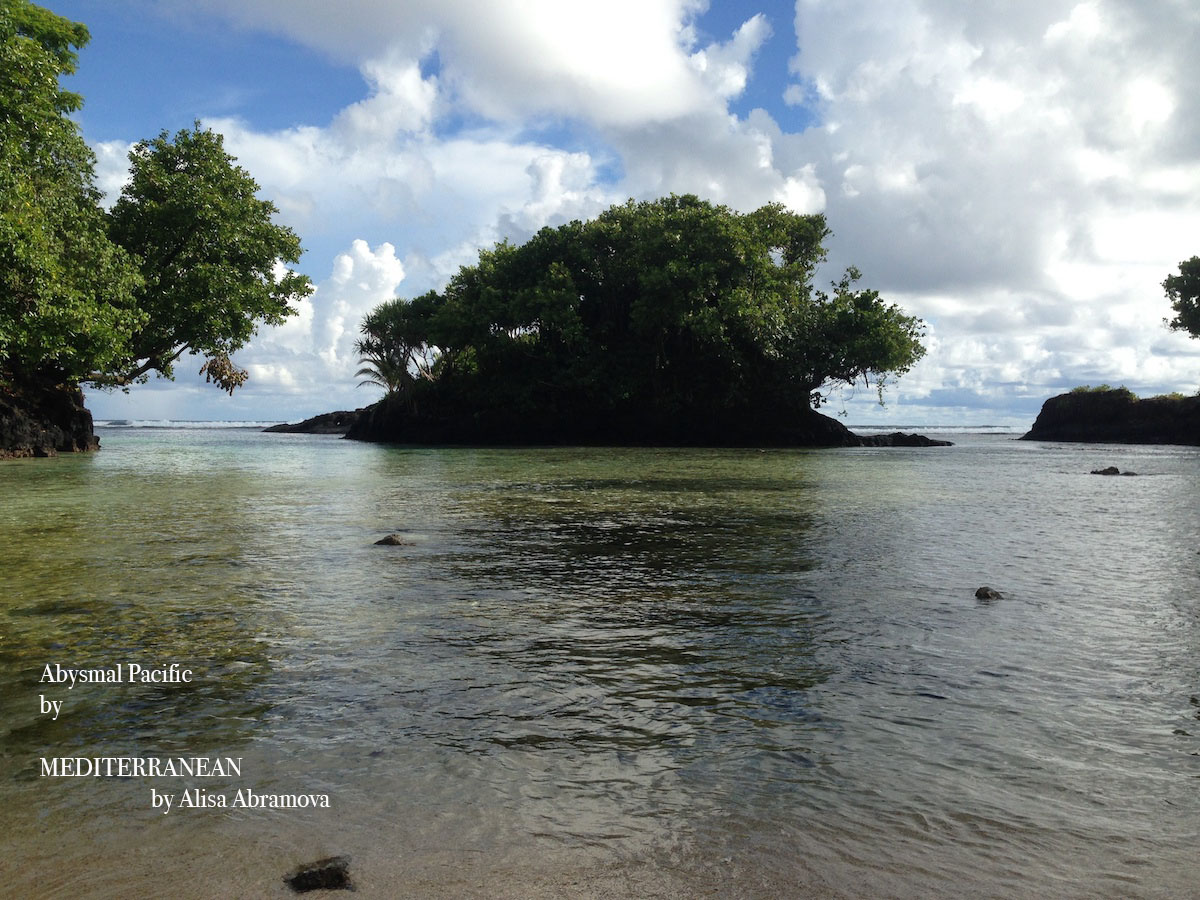
Vavau beach
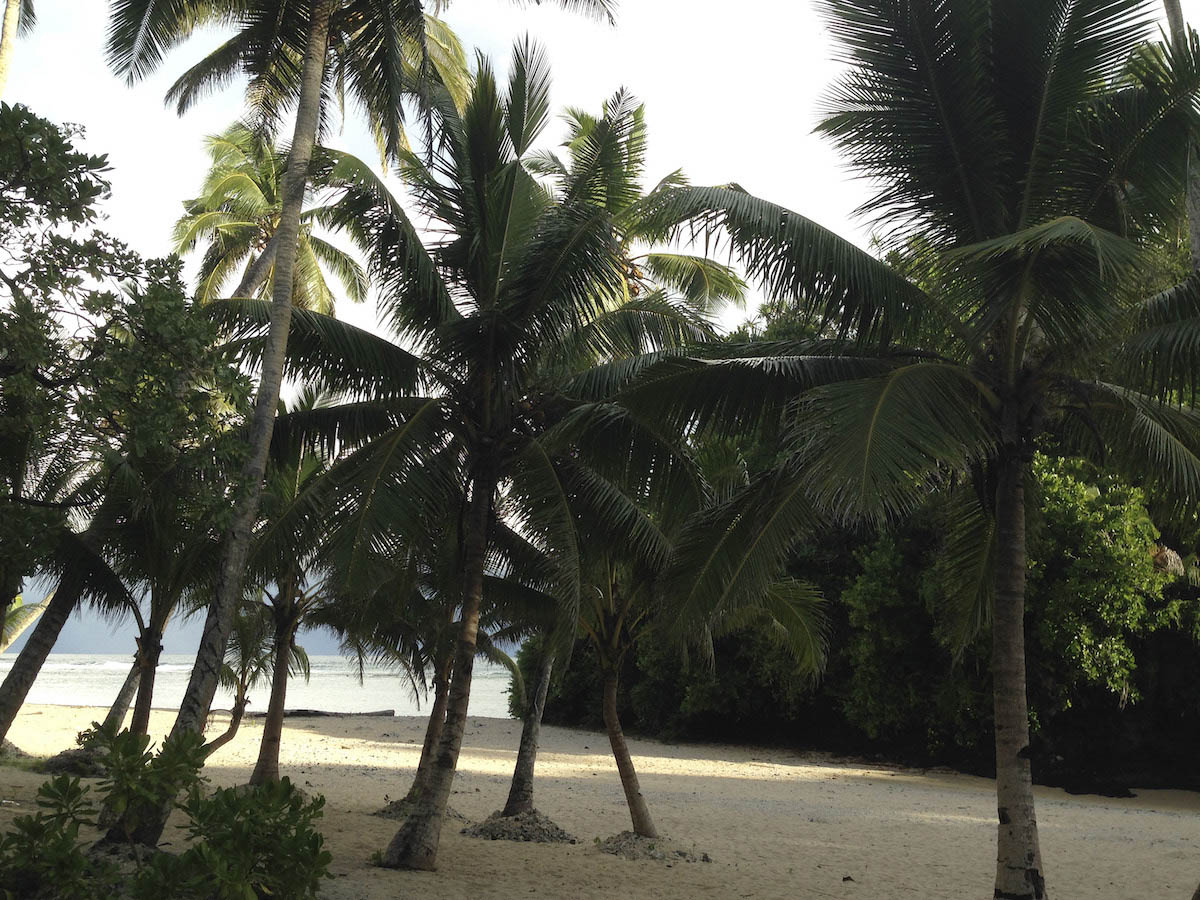
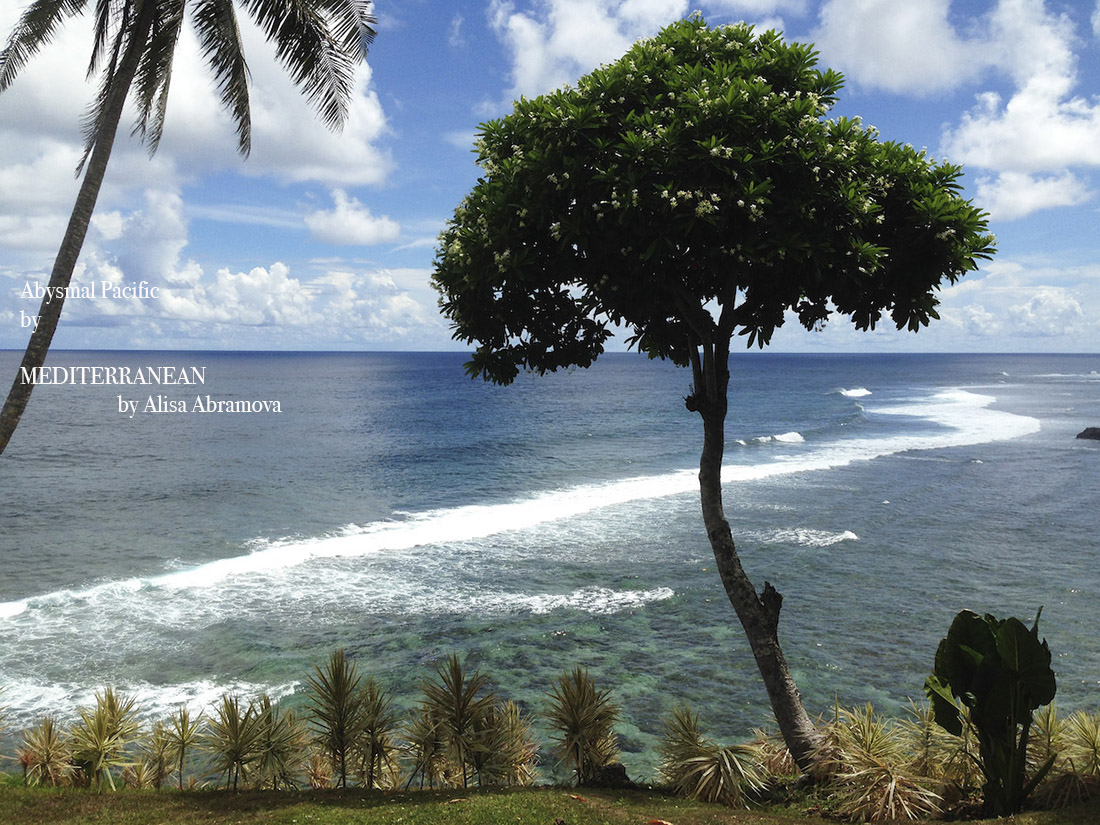
Samoa is also a volcanic country. Both of its biggest islands – Upolu and Savai’i – possess a volcano. The one situated in Savai’i is still active, and the last time it erupted was in 1911. The lava devastated a neighboring village and went through the church, which is still there after a century with the lava now a part of it. The other volcano is now replaced by a beautiful waterfall called Papapapa-tai, situated in its crater.
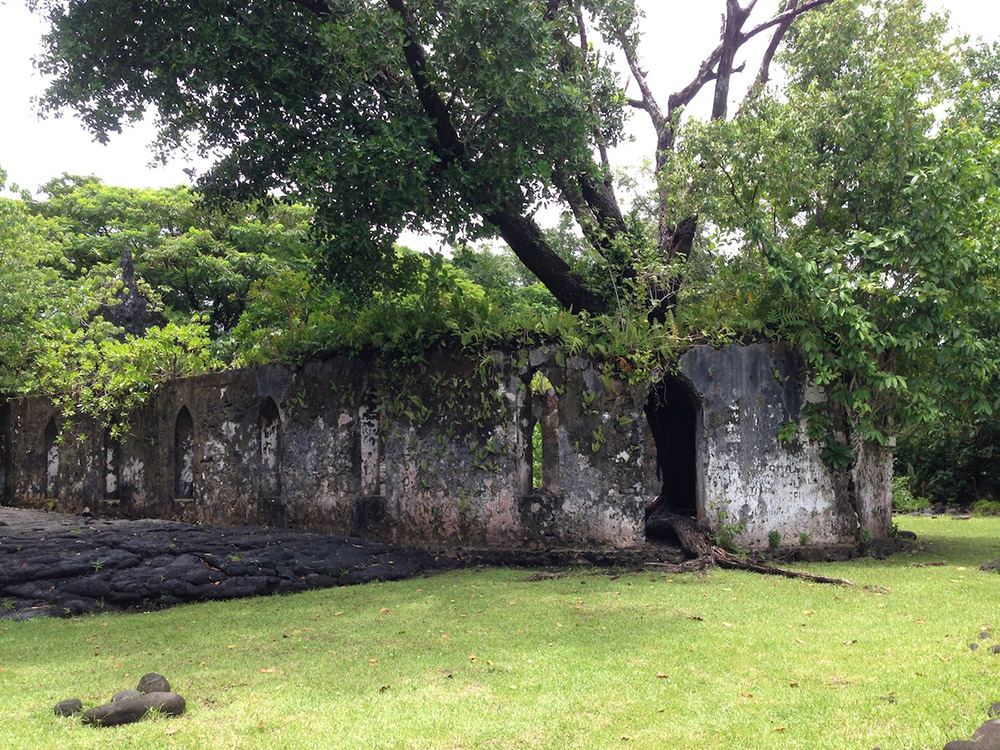
Lava penetrated the Church, Savai’i Island
Learning about Samoans
In general, Samoans are a very friendly and hospitable nation, as well as extremely religious. Churches occupy around 60 percent of all buildings around the islands. Taxes for the needs of the church are high as well.
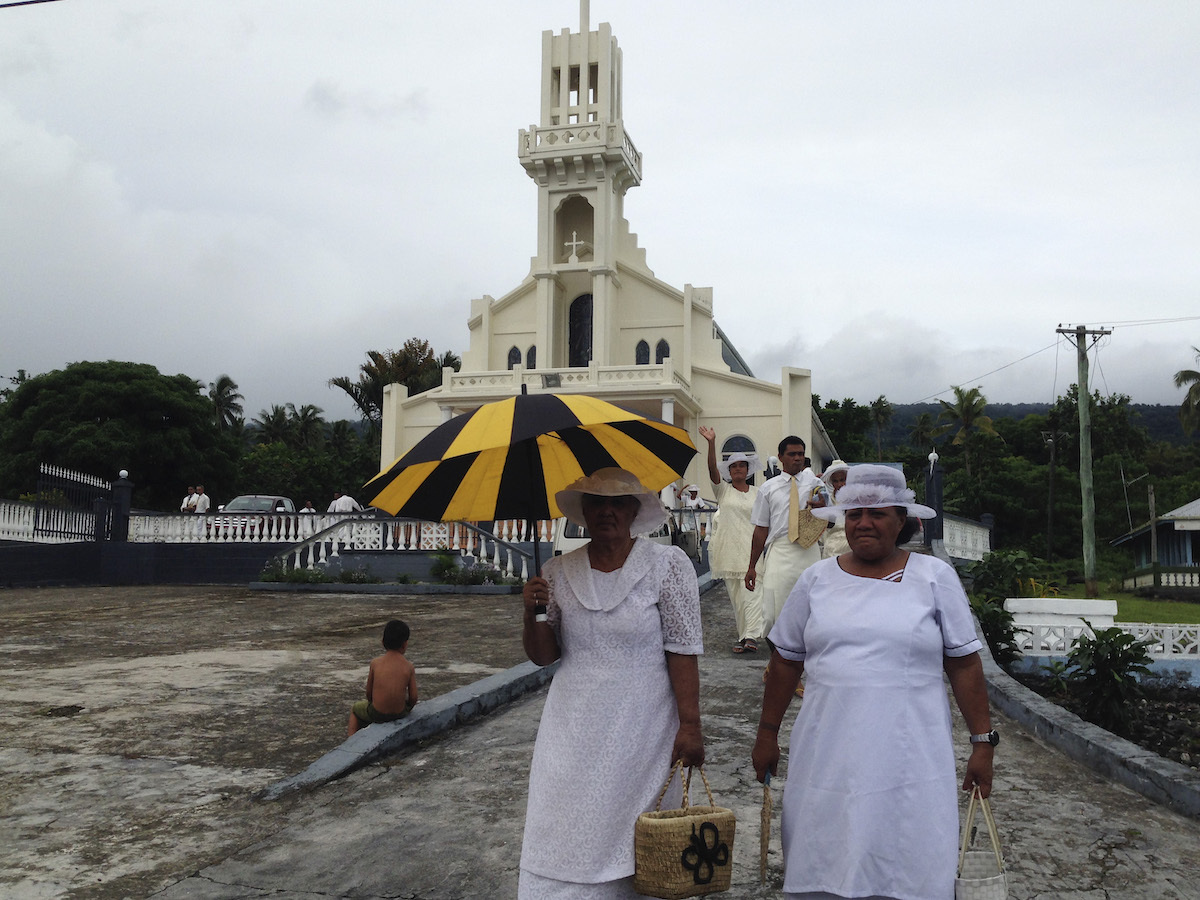
Samoan ladies after a Sunday service, traditionally dressed in white
However, I find there is an outrageous chaos happening in Samoa: gender inequality and impatience to disabled people are flourishing. Strength and health are things that Samoan men worship. It is enough to catch a glimpse of an ordinary Samoan – he will look like he could be Dwayne “The Rock” Johnson’s younger brother.
I understood how serious the matter is when I had to spend the whole day by myself, without my boyfriend. I was brought to Apia city center for shopping. Each time I passed a building or walked along the street, cars beeped and men whistled behind me. It’s a bad idea to start making acquaintances and conversations in a street with local men. And, of course, cover up your body and never express yourself sexually in public. That might be a good reason to go shopping and buy or order a puletasi, a beautiful national outfit. I got my puletasi tailored at AJ Classic Style in Apia for about 50 tala.
Ladies can go to Samoa as solo travelers only if they:
- Stay at an expensive hotel with a high-level services, without poking your nose out.
- If you are not a homebody, rent a car to get around independently and not face taxi drivers who might crack a vulgar joke about you. The easiest way is to get a car from Avis Co., which is open 24 hours at Faleolo airport.
- Grow a mustache.
There is no point in being furious about this attitude toward women. It is both a historical and geographical matter, which will gradually disappear. Life in the middle of Pacific nowhere, far from all continents, leads to consequences. Samoa is 20 to 30 years behind developed countries in the social aspect. However, things are getting better, as more and more international organizations are opening offices there and starting to work, helping to raise social awareness.
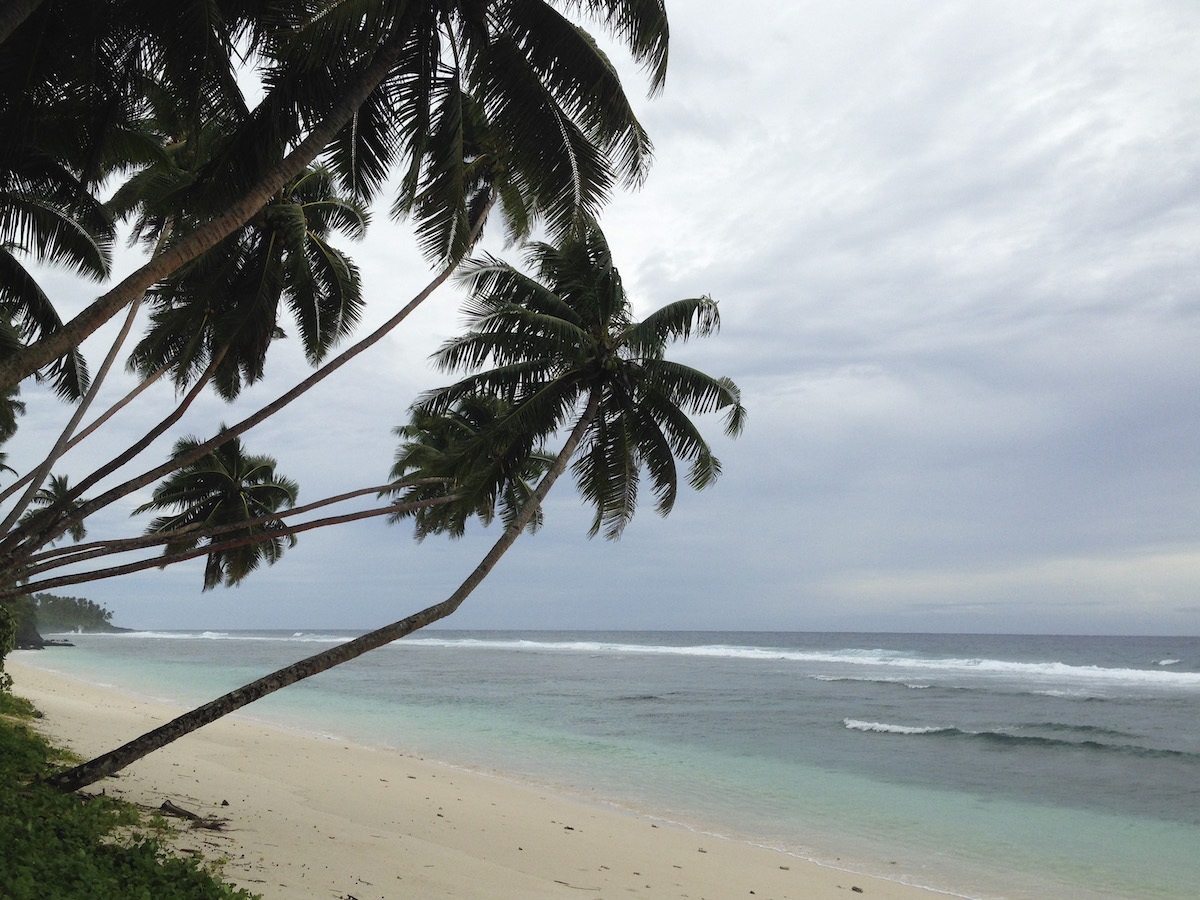
Staying in Samoa
Despite it all, the negative impression does not last long, and is soon retouched by a number of Samoa’s wonders. Indeed, lots of foreigners, mainly Australians and New Zealanders, come to Samoa for work and stay here forever.
One of the most attractive activities for Australians is the great opportunity for surfing. Samoa’s Savai’i island seduces visitors with its pure emerald and turquoise waves suitable for surfers of different levels of experience. Among the biggest pluses of surfing in Samoa are the absence of sharks (there may be smaller species, though) and stinging jellyfishes, as well as low prices at surfing resorts, which are incomparable with the ones in Australia.
One of the coziest surfing resorts of Samoa is Aganoa Beach, situated in Savai’i island. There is a lot of equipment for water recreations – starting with kayaks and finishing with surfing boards.
Do not forget to do snorkeling in Samoa. Magic corals start covering ocean bed three meters away from the beach strip, unveiling a fairytale world – bright, sparkling and lively. In comparison with Fiji, where corals might be cultured in especially expensive and profitable resorts, in Samoa every single coral is wild.
Incidentally, the ocean kingdom of corals is where the biggest danger for surfers lies. you can fall from your board and heavily cut yourself against sharp wild corals. In the majority of cases it causes blood poisoning. Thus, surf, dive and fall cautiously!
Life in Samoa is cheap. Entrance in the country is completely free for citizens of the majority of states. Living in a fale resort like Aganoa Beach during the low rainy season (usually December – May) will cost you 150-200 tala per person per night, including breakfast and dinner. In the high season, with its peak in October, you will be charged 250-300 tala per night at this kind of resort.
For me, who was supposed to spend almost a month in Samoa, it would be more than unprofitable, so renting an apartment was a solution. To lease a totally furnished decent house in a safe area of Apia will cost you 800-1000 tala (1 WST = 0,43 USD) monthly, including water and gas supply, but excluding electricity.
My choice was Fiafia Accommodation in Apia, which cost exactly this amount. Buying groceries for three days at a supermarket will cost you around 60 tala, while a rich dinner for two people at a restaurant will be 100 tala. If you decide to take a trip to Savai’i island, do it with a ferry. A return ticket for a person will cost 20 tala if purchased it beforehand, and 24 tala if you get it on the day of your trip. Transferring your car on the same ferry will cost you 200 tala both ways.
One month in Samoa will drain 3,000 tala (1,300 USD) out of your wallet yet the price includes accommodation, electricity, restaurants, recreation and shopping.
Not that bad to visit a wild mystery, right?
Sincerely,
Alisa Abramova
Recent
Alisa Abramova, a Chaos Manager
One Morning in London: A Cucumber, a Rubber Rat, and Whatever May Happen
I do meet interesting people! Notes from Dubai
Beauty, Inspiration, and a City Reaching for the Sky: A Hong Kong Travel Guide
Explore Ocean Park Hong Kong: Pandas, Sharks & Environmental Education
SimBIOsi Restaurant in Florence
Place: Sea You Beach Bar in Paphos. Shells, Coconuts and XXL Crepes